Startups developing screening of patient’s oral health, single-photon processing for computational imaging, autonomous mobile robots for construction, and sustainable insulation panels out of recycled hair waste each win CHF 10,000
26.06.2023
Dentexion, NovoViz, Robotic On-Site Technologies (ROST), and SolHair win Venture Kick's first stage of financial and entrepreneurial support. Their projects use high-quality 3D clinical images of the patients to efficiently track changes to oral health, such as tooth shape change, movement, and periodontal status; aim to enable novel research in fields such as quantum imaging and machine vision by reducing the complexity of experimental setup and overall costs; deploy autonomous construction robots specifically designed and engineered for the plastering industry; contribute to the construction industry transformation by manufacturing local Insulation Panels made from recycled hair waste and natural binders.
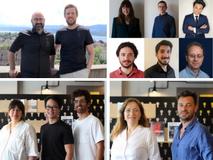 |
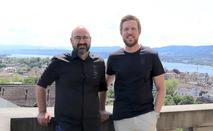 Dentexion: CTO Paulo Fontes and CEO Dennis Madsen
|
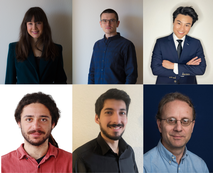 NovoViz Team: CEO Andrada Muntean, CTO Andrei Ardelean, CFO Samuel Cheng, Ekin Kizilkan, Utku Karaca, and Advisor Prof. Edoardo Charbon
|
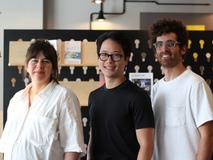 Robotic On-Site Technologies (ROST): COO Dr. Selen Ercan Jenny, CTO Ping-Hsun Tsai, and CEO Eliott Sounigo
|
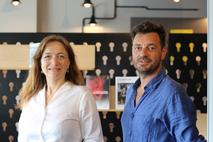 Sol-Hair Team: CEO Maria Vaccaro and CSO Yann Thomas
|
Dentexion: Objective and effective screening of patient’s oral health
Current dental diagnostic procedures are subjective, slow, and do not effectively capture oral health micro changes. However, early detection is crucial for asymptomatic diseases like periodontal disease, severely affecting 10% of adults, with 50% in the early stage.
Dentexions’ AI platform, currently with an MVP undergoing validation studies, directly addresses these challenges. Dentexion uses high-quality 3D clinical images of the patients (Intra-oral scans and 3D X-ray) to efficiently track changes to oral health, such as tooth shape change, movement, and periodontal status. The company was incorporated in 2023 as a startup from the University of Basel and the University of Zürich by the founders Dr. Dennis Madsen (CEO) and Paulo Fontes (CTO/COO).
The Venture Kick fund will contribute to market validation, such as free trial periods and A/B testing for pricing points. dentexion.com
NovoViz: single-photon processing for computational imaging
NovoViz designs and manufactures single-photon computational engines in different technology nodes for applications that demand high sensitivity and high speed but cannot handle large amounts of data. The primary purpose is to make single-photon technology more accessible to everyday users, as currently, available single-photon cameras are specialized pieces of equipment with high technological demands. The team aims to enable novel research in fields such as quantum imaging and machine vision by reducing the complexity of experimental setup and overall costs. The technology used at NovoViz is established on 2 patent applications and more than 10 years of research.
Their complementary team includes the following members: CEO Dr. Andrada Muntean, CTO Dr. Andrei Ardelean, CFO MSc.-MBA Samuel Cheng, MSc. Ekin Kizilkan, MSc. Utku Karaca and advisor Prof. Dr. Edoardo Charbon.
The Venture Kick Stage 1 funds will contribute to kicking off the company.
Robotic On-Site Technologies (ROST): Autonomous mobile robots designed to make construction safer, more efficient, and sustainable
The construction industry is currently facing an unprecedented skilled labor crisis anticipated to impact the sector for the next decade. The average age of construction workers has risen to 40 years, resulting in over 70% of these individuals suffering from chronic pain or injuries by the end of their careers. Particularly in the field of plastering, attracting motivated new recruits is becoming a significant challenge.
At Robotic On-Site Technologies (ROST), the founders are committed to addressing these challenges through the deployment of autonomous construction robots specifically designed and engineered for the plastering industry. Their innovative product employs a unique additive manufacturing technology developed, transforming the multi-step plastering process into a streamlined, thin-layer, plaster 3D printing technique. This approach reduces the required workforce by half, eliminating the most strenuous and repetitive tasks, and enabling the plasterers to have a more attractive, healthy workflow on-site.
The interdisciplinary team behind this project met at ETH Zurich and has skills ranging from the fields of architecture, digital fabrication, and robotics, and from the construction industry. The research team includes Eliott Sounigo, project lead(co-founder), Dr. Selen Ercan Jenny, leading the scientific development(co-founder), Ping-Hsun Tsai, in charge of the software development for the robotic plastering system(co-founder), Dr. Johannes Pankert, an expert in robotic control systems(Senior advisor) and Valentino Russo, an expert in the construction industry with over a decade of experience managing a plastering company(non-executive founder). They are advised by Prof. Dr. Ena Lloret-Fritschi, Prof. Fabio Gramazio, Prof. Matthias Kohler, as well as Prof.Dr. Marco Hutter. In Europe, the plastering (surface finishing) market within the construction industry holds a substantial volume of €19bn. ROST aims to disrupt this market by digitizing construction sites, initially in Switzerland, where labor costs are among the highest in Europe.
With the funds received from the Venture Kick Stage I, ROST plans to upgrade its current prototype to develop its MVP, enabling them to initiate its first pilot project.
Sol-Hair: Manufacturing of sustainable and performant insulation panels out of recycled hair waste
A fundamental regulatory shift occurs to accelerate the adoption of recycled and low-energy construction materials. 35mio buildings are to be renovated by 2030 following new norms imposing whole life cycle GHG reduction targets. At the same time, 30mio tons of hair waste is generated p.a.
Sol-Hair contributes to the construction industry transformation by manufacturing local Insulation Panels made from recycled hair waste and natural binders. Apart from being offered for the first time, this solution allows 40 to 80% of energy savings thanks to largely available row material which does not require raising, mining, or transformation, unlike conventional energy-intensive products. It offers excellent thermo-conductivity performance (38mW/(m*K)). The European Insulation materials market represents 17bnEUR, with the rapid growth of bio-sourced products.
Sol-Hair SA is in the process of incorporation by 2 founders: Maria Vaccaro, CEO with 20 years of international management experience specializing in start-ups of new ventures/scale-up/industrialization, and Yann Thomas, CSO bringing 20 years of entrepreneurship in the beauty industry. Sol-Hair partnered with HEIG-VD for feasibility studies and further product improvement.
The Venture Kick funds will contribute to the final phase of product development to kick off the certification process. Sol-Hair's Linked page.
Current dental diagnostic procedures are subjective, slow, and do not effectively capture oral health micro changes. However, early detection is crucial for asymptomatic diseases like periodontal disease, severely affecting 10% of adults, with 50% in the early stage.
Dentexions’ AI platform, currently with an MVP undergoing validation studies, directly addresses these challenges. Dentexion uses high-quality 3D clinical images of the patients (Intra-oral scans and 3D X-ray) to efficiently track changes to oral health, such as tooth shape change, movement, and periodontal status. The company was incorporated in 2023 as a startup from the University of Basel and the University of Zürich by the founders Dr. Dennis Madsen (CEO) and Paulo Fontes (CTO/COO).
The Venture Kick fund will contribute to market validation, such as free trial periods and A/B testing for pricing points. dentexion.com
NovoViz: single-photon processing for computational imaging
NovoViz designs and manufactures single-photon computational engines in different technology nodes for applications that demand high sensitivity and high speed but cannot handle large amounts of data. The primary purpose is to make single-photon technology more accessible to everyday users, as currently, available single-photon cameras are specialized pieces of equipment with high technological demands. The team aims to enable novel research in fields such as quantum imaging and machine vision by reducing the complexity of experimental setup and overall costs. The technology used at NovoViz is established on 2 patent applications and more than 10 years of research.
Their complementary team includes the following members: CEO Dr. Andrada Muntean, CTO Dr. Andrei Ardelean, CFO MSc.-MBA Samuel Cheng, MSc. Ekin Kizilkan, MSc. Utku Karaca and advisor Prof. Dr. Edoardo Charbon.
The Venture Kick Stage 1 funds will contribute to kicking off the company.
Robotic On-Site Technologies (ROST): Autonomous mobile robots designed to make construction safer, more efficient, and sustainable
The construction industry is currently facing an unprecedented skilled labor crisis anticipated to impact the sector for the next decade. The average age of construction workers has risen to 40 years, resulting in over 70% of these individuals suffering from chronic pain or injuries by the end of their careers. Particularly in the field of plastering, attracting motivated new recruits is becoming a significant challenge.
At Robotic On-Site Technologies (ROST), the founders are committed to addressing these challenges through the deployment of autonomous construction robots specifically designed and engineered for the plastering industry. Their innovative product employs a unique additive manufacturing technology developed, transforming the multi-step plastering process into a streamlined, thin-layer, plaster 3D printing technique. This approach reduces the required workforce by half, eliminating the most strenuous and repetitive tasks, and enabling the plasterers to have a more attractive, healthy workflow on-site.
The interdisciplinary team behind this project met at ETH Zurich and has skills ranging from the fields of architecture, digital fabrication, and robotics, and from the construction industry. The research team includes Eliott Sounigo, project lead(co-founder), Dr. Selen Ercan Jenny, leading the scientific development(co-founder), Ping-Hsun Tsai, in charge of the software development for the robotic plastering system(co-founder), Dr. Johannes Pankert, an expert in robotic control systems(Senior advisor) and Valentino Russo, an expert in the construction industry with over a decade of experience managing a plastering company(non-executive founder). They are advised by Prof. Dr. Ena Lloret-Fritschi, Prof. Fabio Gramazio, Prof. Matthias Kohler, as well as Prof.Dr. Marco Hutter. In Europe, the plastering (surface finishing) market within the construction industry holds a substantial volume of €19bn. ROST aims to disrupt this market by digitizing construction sites, initially in Switzerland, where labor costs are among the highest in Europe.
With the funds received from the Venture Kick Stage I, ROST plans to upgrade its current prototype to develop its MVP, enabling them to initiate its first pilot project.
Sol-Hair: Manufacturing of sustainable and performant insulation panels out of recycled hair waste
A fundamental regulatory shift occurs to accelerate the adoption of recycled and low-energy construction materials. 35mio buildings are to be renovated by 2030 following new norms imposing whole life cycle GHG reduction targets. At the same time, 30mio tons of hair waste is generated p.a.
Sol-Hair contributes to the construction industry transformation by manufacturing local Insulation Panels made from recycled hair waste and natural binders. Apart from being offered for the first time, this solution allows 40 to 80% of energy savings thanks to largely available row material which does not require raising, mining, or transformation, unlike conventional energy-intensive products. It offers excellent thermo-conductivity performance (38mW/(m*K)). The European Insulation materials market represents 17bnEUR, with the rapid growth of bio-sourced products.
Sol-Hair SA is in the process of incorporation by 2 founders: Maria Vaccaro, CEO with 20 years of international management experience specializing in start-ups of new ventures/scale-up/industrialization, and Yann Thomas, CSO bringing 20 years of entrepreneurship in the beauty industry. Sol-Hair partnered with HEIG-VD for feasibility studies and further product improvement.
The Venture Kick funds will contribute to the final phase of product development to kick off the certification process. Sol-Hair's Linked page.


